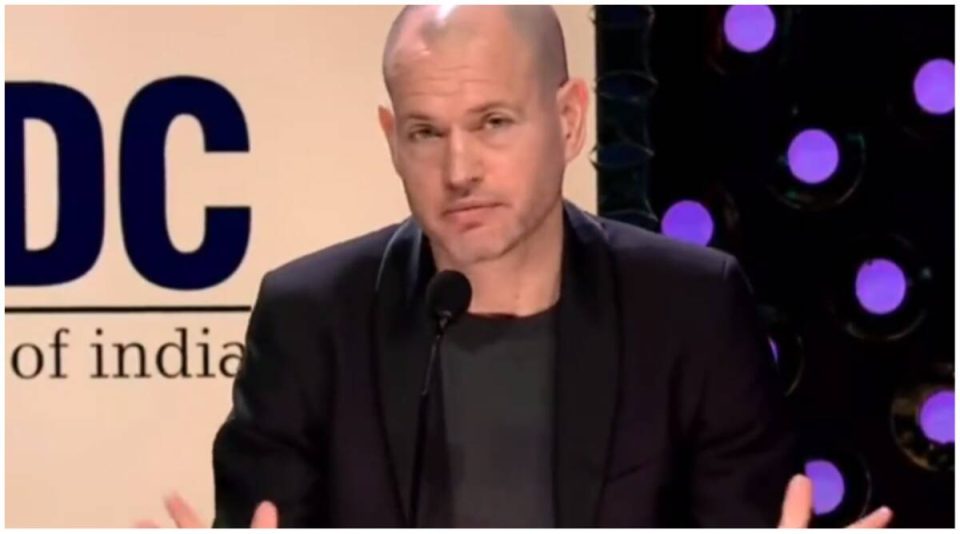
‘The Kashmir Files’ row: Meet Nadav Lapid, the Israeli filmmaker in the eye of storm

Israeli filmmaker Nadav Lapid, the jury chair at the 53rd edition of the International Film Festival of India (IFFI), is in the eye of the storm after he described Vivek Agnhotri’s film The Kashmir Files as “vulgar” and “propaganda” at IFFI’s closing ceremony in Goa on Monday (November 28).
Lapid, 47, the chairman of the jury of the International Competition section at IFFI, said: “There were 15 films in the international competition — the front window of the festival. Fourteen out of them had cinematic qualities… and evoked vivid discussions. We were, all of us, disturbed and shocked by the 15th film, The Kashmir Files. That felt to us like a propaganda, vulgar movie, inappropriate for an artistic competitive section of such a prestigious film festival.” “I feel comfortable to openly share this feeling with you since the spirit of the festival can truly accept critical discussion which is essential for art and life,” Lapid added.
‘The Kashmir Files’, which is based on the Kashmiri Pundits’ genocide, was released in theatres on March 11. It was screened on November 22 as part of the Indian Panorama Section at IFFI.
The reaction
A video clip of Lapid’s speech has also gone viral on social media. Lapid’s remark has sparked outrage. A Supreme Court lawyer in Goa has filed a police complaint against Lapid over his remarks. In his response, Vivek Agnihotri has said that “terror supporters and genocide deniers can never silence me.”
Agnihotri took to his Twitter handle on Tuesday to share a video where he has opened up about the remarks made against his film. He says in the video: “This is nothing new for me because these kinds of words have been used by terrorist organisations and urban naxals, and those supporting ‘Bharat ke tukde tukde’. But what is surprising is that on the stage of an event organised by the Government of India, this narrative by terrorists wanting to separate Kashmir from India was supported.”
Besides Agnihotri, the film’s actors, Anupam Kher and Darshan Kumaar, have also reacted strongly to Lapid’s remarks. Kher said, “I feel that in every country which has freedom of speech, there are people who think that they can take the platform and utilise it in a way they want to express their views. They cannot use their views in the form of words like vulgar.” ‘Kashmir Files’ is not on vulgarity but on reality, Kumaar told a news agency.
Israeli ambassador to India Naor Gilon issued an open letter in which he told Lapid that he “should be ashamed”. Gilon, son of a Holocaust survivor, slammed the Israeli filmmaker, saying he was “extremely hurt to see reactions in India” to Lapid “that are doubting Schindler’s List, the Holocaust and worse”.
Israel’s Consul General to Midwest Kobbi Shoshani called Kher to apologise, the diplomat said on Tuesday. “After I heard the speech which we don’t accept, first person I called in morning was Anupam Kher, to apologise about speech that was a private opinion, maybe with some other European jurors, but nothing to do with State of Israel,” Kobbi Shoshani was quoted as saying by news agency ANI.
Also read: Israeli envoy slams Nadav Lapid for ‘Kashmir Files’ remark; IFFI jury says opinion ‘personal’
A rebel with a cause
Born in 1975 to Jewish parents, Lapid studied Philosophy at the Tel Aviv University. After completing his mandatory service with the Israeli Defence Forces, he moved to Paris. Later, he returned to Israel to pursue a degree at the Sam Spiegel Film and Television School in Jerusalem.
Lapid’s films, made during his career spanning nearly two decades, reflect his background in Philosophy. The filmmaker, who has directed 13 films in total — which include both full-length features and short films — handles weighty themes with dark humour, blending serious issues with absurdist situational comedies.
Lapid’s is known for making politically volatile films. His curiously bifurcated debut feature film, ‘Policeman’ (2011), is told from the point of view of both an Israeli counter-terrorism unit and a band of young policemen. The film, in which the main character is the head of Israel’s counter terrorism forces, delves into the complexities of the Israeli police. It won the Locarno Festival Special Jury Prize at the Locarno International Film Festival in 2011 as well as multiple awards in the Jerusalem film festival.
‘Policeman’, which showed Lapid’s deep empathy and ability to portray complex, multi-dimensional characters on screen, announced the arrival of a cinematic genius on the world stage. In his 2014 film ‘The Kindergarten Teacher,’ Lapid beautifully portrays the relationship between a kindergarten teacher and a young child who has a gift for poetry. Featured in the International Critics Week at Cannes, the film is filled with stunning visuals and profound dialogue. Lapid tackles some serious themes through the poetry of the child.
‘The Kindergarten Teacher’ was described by A. O. Scott of ‘The New York Times’ as “suspenseful, unnerving, bizarre and strangely believable plot.” In the film, Nira (Sarit Larry), the kindergarten teacher, discovers that one of her pupils Yoav (Avi Shnaidman) recites original poetry — startling acts of creation. She herself participates in a poetry workshop and steals Yoav’s poem for her presentations. She is drawn to him, intrudes on his naps to stimulate his creativity and becomes more and more involved in his personal life outside of school.
Lapid explores the issues of prodigy, of the creative process and the value of poetry in a materialistic, complacent society. ‘Policeman’ criticized Israeli society with two plots which eventually coincided. ‘The Kindergarten Teacher’ continues this trend, it surprises and mystifies; the viewer needs to work to root out the meaning. It was later remade with Maggie Gyllenhaal in the lead role.
‘Synonyms’ (2019) is an exaggerated autobiographical story about a young Israeli who, upon finishing his military service, flees to Paris in an effort to shed his identity. There, he refuses to speak Hebrew, latching on to his French thesaurus as he tries to reinvent himself. The film won the top prize at the Berlin Film Festival. Steeped in details that resonate with Israelis and diaspora Jews, Lapid’s films shine light on the complicated relationship he himself shares with his homeland.
Lapid’s researches into Israel’s soul
As a filmmaker, Lapid is preoccupied with exploring the dichotomous relationship with Israel and his Jewish identity. On one hand, he embraces his Jewish heritage and identity, laments global antisemitism and portrays the daily lives of Jews within and without Israel. On the other hand, his films are critical of Israel’s militarism and curtailment of freedoms. His latest film ‘Ahed’s Knee’ (2021) dealt with some of his inner conflicts as a filmmaker.

Lapid is the recipient of the Chevalier des Arts et des Lettres (one of France’s highest civilian awards recognising contribution in the field of arts). He has been a part of various film juries across the world. His 2021 film, ‘Ahed’s Knee’ was internationally acclaimed. It premiered at Cannes, where it won the jury prize. Like some of his previous ventures, ‘Ahed’s Knee’ is an autobiographical story — both lyrical and physical — of an auteur angry at his own country.
A filmmaker (played by Avshalom Pollak) goes on a trip to a small Israeli desert town to accompany a film screening. Once there, he encounters Yahalom (Nur Fibak), a worker for the Ministry of Culture who acts as his local guide, but he suspects may have a more sinister agenda via a letter she asks him to sign.
The film contains some searing critique of the Israeli government. In his interviews, Lapid, however insists that it is his love for his home country that continues to bubble beneath the surface in his work. It’s an uncomfortable watch that provokes intriguing discourse.
While his films are critical of the Israel government, there is hardly any Palestinian in them. “I think it’s because I’m totally fascinated by this research into Israel’s soul. I feel that the Palestinians are already present inside the Israeli soul. When Israelis look in the mirror, they also see the reflections of Palestinians. The feelings of fear, anxiety, hate, guilt, otherness. It’s the shadow that accompanies Israelis whenever they go.”
Earlier this year, Lapid joined a group of 250 Israeli filmmakers who signed an open letter to protest against the launch of the Shomron (Samaria/West Bank) Film Fund. The group felt the only goal of the Fund was to use filmmakers to “actively participate in whitewashing the Occupation.” He has consequently drawn flak from people within the Israeli state.


